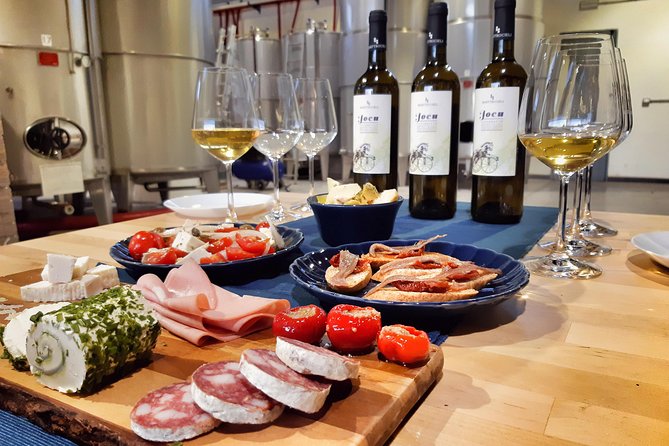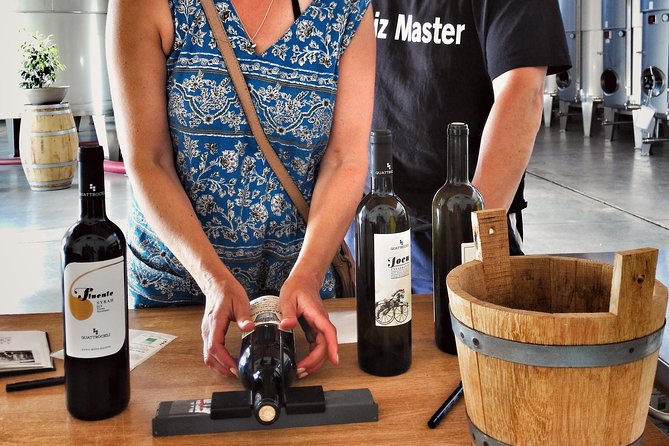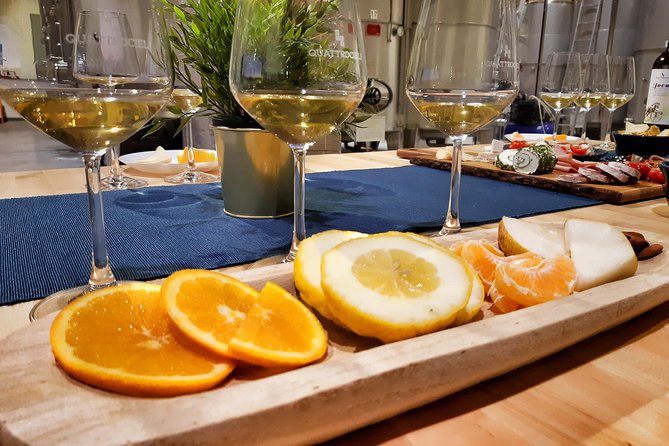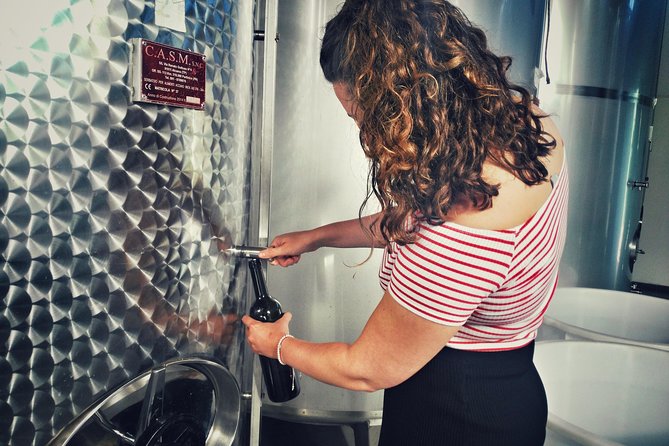Sensory Tasting With Organic Wines
In a world where taste buds are often left unchallenged, organic wines emerge as the unsung heroes of sensory exploration. Each sip of these carefully crafted vintages whispers a tale of terroir and tradition, inviting the imbiber into a realm where every swirl and sniff holds a promise of discovery.
The marriage of nature’s bounty and human ingenuity unfolds in a symphony of flavors that dance on the palate, beckoning the curious soul to venture deeper into the realms of sustainable viticulture.
Key Points

- Organic wines offer vibrant aromas and diverse taste profiles, enhancing sensory tasting experiences.
- Sustainable viticulture methods in organic winemaking promote biodiversity and soil health, reflecting in the wine’s authenticity.
- Pairing organic wines with food elevates flavors and dining enjoyment, emphasizing the wine’s unique qualities.
- Engaging in sensory tasting regularly sharpens the palate, deepening understanding and appreciation of organic wines.
Benefits of Organic Wines

Organic wines offer a range of benefits that appeal to environmentally conscious consumers and those seeking a more natural approach to winemaking.
When it comes to health benefits, organic wines are produced without synthetic pesticides or herbicides, reducing the risk of chemical residues in the final product. This aspect can be particularly appealing to individuals with sensitivities to these substances.
On top of that, the environmental impact of organic winemaking is significant. By eschewing synthetic chemicals and promoting biodiversity in vineyards, organic practices help preserve soil health, protect water quality, and support overall ecosystem balance.
Choosing organic wines not only benefits personal health but also contributes to a more sustainable and eco-friendly approach to winemaking.
Importance of Sustainable Viticulture

Implementing sustainable viticulture practices in vineyards is crucial for ensuring long-term environmental stewardship and the continued production of high-quality wines. Sustainable viticulture focuses on maintaining the delicate balance of ecosystems within vineyards to promote biodiversity and soil health.
Here are four key aspects highlighting the importance of sustainable viticulture:
-
Soil health: Sustainable practices such as cover cropping, composting, and minimal tillage help improve soil fertility, structure, and water retention.
-
Biodiversity conservation: Preserving natural habitats in vineyards encourages beneficial insects, birds, and other wildlife, which contribute to pest control and overall ecosystem health.
-
Integrated pest management techniques reduce the need for synthetic pesticides, promoting a healthier environment for both vineyard workers and surrounding communities.
-
Water conservation strategies, such as drip irrigation and water recycling, help minimize water usage and protect local water sources.
Enhancing Wine Appreciation Through Senses
Enhancing the appreciation of wine through engaging the senses elevates the tasting experience to a sensory journey of aromas, flavors, and textures that unveil the intricacies of each glass. Sensory exploration is a key aspect of wine education, allowing enthusiasts to explore the nuances of different varietals.
By employing various tasting techniques, you can heighten their sensory experience, taking note of the subtle differences in each sip. Through sight, smell, taste, and touch, one can fully enjoy the world of wine, learning to discern the complexities of organic wines.
This hands-on approach not only deepens one’s understanding but also enriches the overall enjoyment of wine, making each tasting session a rewarding and enlightening experience.
Exploring Flavor Profiles in Organic Wines

With a diverse array of flavor profiles, exploring organic wines offers a captivating journey for the taste buds.
-
Wine Aromas: Organic wines often boast vibrant and distinct aromas that range from fruity notes like berries and citrus to earthy tones like herbs and minerals. These complex scents add depth to the tasting experience.
-
Taste Sensations: From crisp and refreshing whites to bold and robust reds, organic wines showcase a spectrum of taste sensations. Each sip can reveal layers of flavors, including hints of oak, spices, or floral undertones that tantalize the palate.
-
Balanced Complexity: Organic winemakers prioritize natural cultivation methods, resulting in wines with a balanced complexity that harmoniously blends different flavor elements for a harmonious drinking experience.
-
Expressive Terroir: Organic wines often reflect the unique terroir of the vineyard, with flavors that echo the soil, climate, and geography where the grapes were grown, offering a genuine taste of the land.
Pairing Organic Wines With Food

Pair your organic wines thoughtfully with complementary dishes to enhance the flavors and elevate your dining experience. Food pairings play a crucial role in creating a memorable sensory experience when enjoying organic wines.
Light and crisp white wines like Sauvignon Blanc pair excellently with fresh salads, seafood, or light pasta dishes, enhancing the overall taste.
For red wine enthusiasts, bold organic Cabernet Sauvignon or Merlot can be paired with rich red meats, aged cheeses, or dark chocolate desserts to create a harmonious balance of flavors.
Consider the wine’s acidity, tannins, and sweetness when selecting the perfect dish to accompany your organic wine. By paying attention to food pairings, you can elevate the sensory experience and fully appreciate the unique qualities of organic wines.
Engaging in Sensory Tasting Techniques

To fully appreciate the nuances of organic wines, engage in sensory tasting techniques that involve exploring aromas, flavors, and textures through deliberate observation and thoughtful analysis.
-
Utilize a Wine Aroma Wheel: Start by identifying primary aromas like fruits, flowers, or spices before moving on to secondary scents like fermentation or aging notes.
-
Consider Mouthfeel: Pay attention to the wine’s body, acidity, tannins, and alcohol content to understand how they contribute to the overall tasting experience.
-
Evaluate Flavor Profiles: Note the different flavors present, such as fruity, earthy, or oaky notes, and how they evolve on the palate.
-
Experiment with Food Pairings: Enhance the tasting experience by trying the wine with various foods to see how flavors interact and complement each other.
Understanding Organic Wine Production
Organic wine production involves cultivating grapes without the use of synthetic pesticides or fertilizers, emphasizing sustainable practices that prioritize environmental health and biodiversity.
Organic farming techniques focus on natural methods like composting, cover crops, and beneficial insects to maintain soil quality and grapevine health. By avoiding synthetic chemicals, organic vineyards contribute to a reduced environmental impact, preserving water quality, and promoting biodiversity by supporting a healthier ecosystem.
These practices not only benefit the environment but also result in wines that reflect the unique terroir of the vineyard, showcasing the pure expression of the grape variety. Understanding the principles behind organic wine production allows consumers to make informed choices that support sustainability and environmental stewardship in the wine industry.
Tips for Hosting Organic Wine Tastings

When planning a gathering centered around organic wine, consider incorporating interactive tasting stations to engage guests and enhance their sensory experience. To ensure a successful organic wine tasting event, follow these tips:
-
Include a variety of organic wines: Showcase different types of organic wines such as reds, whites, rosés, and sparkling wines to cater to various preferences.
-
Provide tasting notes: Offer guests information about each wine’s flavor profile, aroma, and origin to enhance their understanding and appreciation of organic wine trends.
-
Pair with organic foods: Complement the wines with organic cheeses, fruits, and chocolates to create harmonious flavor combinations.
-
Encourage sensory exploration: Guide guests to engage all their senses by observing the wine’s color, swirling to release aromas, and savoring the taste.
Common questions
Are There Any Specific Health Benefits Associated With Consuming Organic Wines?
Consuming organic wines may offer nutritional benefits due to fewer chemicals. Sustainability practices in organic vineyards reduce environmental impact. Taste preferences can also be influenced positively. However, individual reactions vary, so it’s essential to consider personal health factors.
How Does the Use of Organic Farming Practices Affect the Taste of Wines Compared to Conventionally Produced Wines?
Organic farming practices influence taste by enhancing soil quality, leading to distinct flavor profiles in wines compared to conventionally produced ones. This difference in production methods translates into a noticeable taste comparison, with organic wines often showcasing unique and vibrant characteristics.
Can Organic Wines Be Aged and Stored in the Same Way as Non-Organic Wines?
Organic wines can be aged and stored similarly to non-organic wines. The aging process and storage requirements remain consistent, preserving the flavors. Through organic practices, these wines maintain their unique characteristics while evolving gracefully over time.
Are There Any Certifications or Labels That Consumers Should Look for When Purchasing Organic Wines?
When purchasing organic wines, consumers should look for certifications like USDA Organic, EU Organic, or Demeter Biodynamic. These labels ensure transparency and help differentiate products. Trust in these certifications empowers consumers to make informed choices.
Do Organic Wines Tend to Be More Expensive Than Non-Organic Wines, and if So, Why?
Organic wines can be pricier due to higher production costs, lower yields, and certification expenses. Market demand influences pricing, with eco-conscious consumers willing to pay more. Organic methods benefit the environment, promoting sustainable practices in winemaking.
Last Words
Set out on a sensory journey with organic wines and discover a world of sustainable viticulture and exquisite flavors. From the benefits of organic wines to the importance of sustainable practices, there’s so much to learn and explore.
Enhance your wine appreciation through engaging in sensory tasting techniques and understanding the art of organic wine production. Whether you’re a seasoned connoisseur or a newcomer to the world of wine, organic wines offer a unique and unforgettable experience for all.
Cheers to sustainability and quality in every glass!